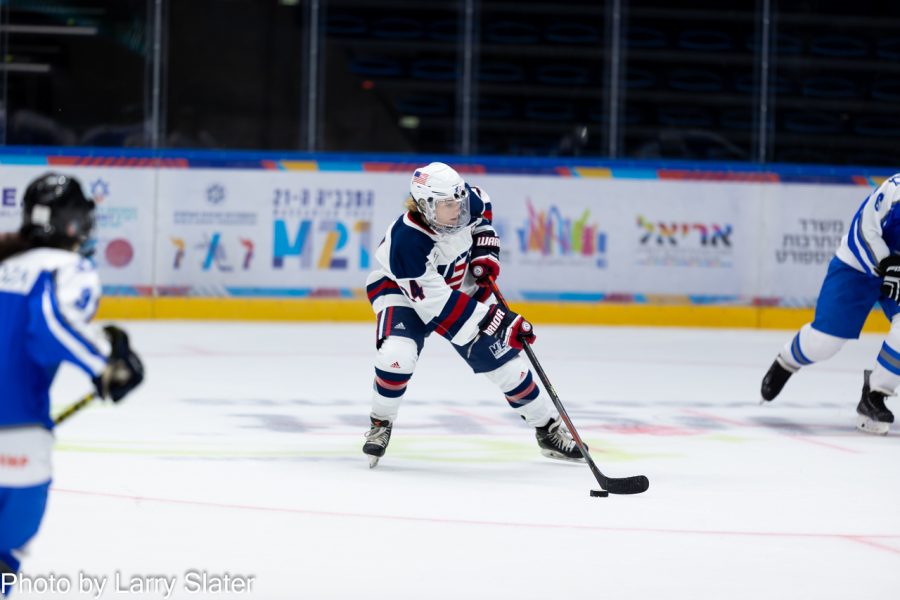Northeastern alum Goldberg brings women’s hockey to Maccabiah Games
Chelsey Goldberg on ice against Team Israel at the 21st Maccabiah Games.
September 6, 2022
Chelsey Goldberg had a dream: to play at the Maccabiah Games in Israel.
In 2013, her twin brother was invited to play on Team USA at the Maccabiah Games in Israel. As there was no women’s team, Chelsey, then a sophomore ice hockey forward at Northeastern University, asked to play alongside him. Her request was denied.
The Maccabiah Games, also known as the Jewish Olympics, occurs every four years in Israel. One of the world’s largest sporting events, the games bring together some of the best Jewish athletes in the world — but women’s hockey has never been featured.
Goldberg again asked to join the team when her brother was offered a spot in 2017, but to no avail.
“From that point on…I was more motivated than ever to get a women’s team over there,” the 29-year-old said. “And so, I took it upon myself, with the help of a couple chair members, to [put a team together].”
Unsure of where to begin, Goldberg reached out to Devra Schorr, co-chair of Maccabi USA’s ice hockey team, for help building a women’s hockey program. From then on, Goldberg and Schorr worked tirelessly to pull together a team.
“[Schorr] was all in with me, wanted this to happen just as much as I did. So, for the past eight years, we’ve been tag-teaming and figuring out what we needed to do on our end to make it happen,” Goldberg said.
It began with proving there was enthusiasm for a women’s hockey event.
“For eight years now, I’ve had an ongoing spreadsheet of girls that I either remember being Jewish that I’ve played with, or that people had sent to me that they know are Jewish,” Goldberg said. “[There was] a lot of DMing on social media, a lot of social media posts.”
This year, she realized that dream.
After almost nine years of compiling resources and recruiting athletes, the former Husky hockey player and two-time Beanpot champion succeeded in bringing women’s hockey to the 21st Jewish Olympics.
“Nobody could really put into words what they were feeling, myself included,” Goldberg said of seeing her dream come to fruition. “It still hasn’t hit me, to be quite honest.”
Three teams battled for gold at the inaugural women’s hockey competition in July: the United States, Canada and Israel.
As captain, Goldberg led Team USA to silver.
For Goldberg, the personal impact that Maccabi’s inclusion of women’s hockey had was twofold.
First, it aligned perfectly with her professional mission.
Goldberg, who has played hockey professionally since graduating from Northeastern in 2016, currently plays for the Professional Women’s Hockey Player’s Association, or PWHPA. The PWHPA is a nonprofit organization devoted to expanding women’s hockey and advocating for the rights of professional women’s hockey players in North America.
The PWHPA was built after the collapse of the Canadian Women’s Hockey League, or CWHL, a league that paid only in small stipends and provided few opportunities for women’s hockey players to play.
“We formed the PWHPA to fight for a league and fight for a sustainable league,” Goldberg said. “[In the CWHL], we all had to work full time as well as playing professionally. So we were balancing two full-time jobs.”
Second, participating in the games gave her an opportunity to explore and connect with people through her faith.
“What a cool experience to have all these Jewish athletes come together representing their sport and combining their faith and sport,” Goldberg said. “You looked around, and you were like, ‘Wait a second, they’re Jewish. They’re Jewish.’ It was just a special bond that we were all sharing together.”
Goldberg’s next mission is to create more opportunities for Israeli hockey on the international stage.
Growing hockey in Israel will not be an easy task. Hockey does not occupy the same cultural space there that it does in Canada or the United States, but Goldberg knows there is potential.
“It brought tears to my eyes, just of joy, seeing that women’s hockey does exist over in the Middle East,” Goldberg remembered. “It’s continuing to grow. I told them that I want to help them as much as I can from the States. It’s going to be a team effort moving forward with every party involved: Americans, Canadians, Israelis, all moving forward. We all want women’s hockey to grow.”
Goldberg said she is “so beyond hopeful” for the future of women’s hockey.
“We are actually getting paid this year in the PWHPA,” she said. “We don’t know how much yet, but it’s a step in the right direction.”







